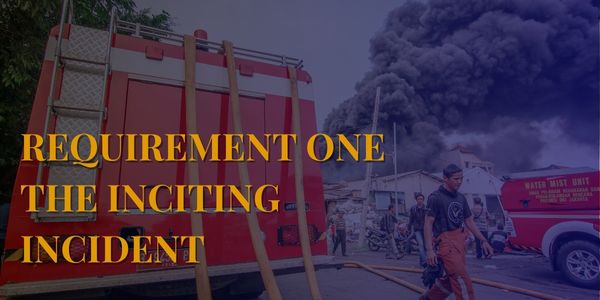
Every story needs the same Five Requirements, just presented in unique ways, both to the genre and the story itself.
That first Requirement is the Inciting Incident of the story. This incident or event must deliver a promise, hook the reader, and propel the story forward. It’s the reason the reader picked up the book in the first place. But it’s a lot of weight to carry for one little event. Without it, there is no story; the character will have nothing to react to.
Shawn Coyne, an editor with twenty plus years experience and creator of The Story Grid, wrote,
“Without an Inciting Incident, nothing meaningful can happen. And when nothing meaningful happens, it’s not a Story.”
So if this Requirement is so important, how do you get it right?
Well, like most things with story, start with your genre. It will tell you so much about what needs to happen to propel your characters to act. For example, a war story’s Incident is that a war or a battle has begun. A war is what drives the soldier to act: enlist, join a specific battle, or even run and hide.
A love story’s Incident will be much different, and typically is an Essential Scene: the two lovers meet. A two-fer, if you will. That makes writing a bit easier, but it’s something to remember. Your Inciting Incident of any genre will most likely be one of its Essential Scenes.
Setting up this scene in a unique way is the fun part. Just because a war has broken out, doesn’t mean it has to show the first bombings. In the movie American Sniper, it was the attack on the US Embassy shown on the news, but what’s interesting is that this event doesn’t necessarily have to be on the page. The war could have started before the book begins, but it must be the event that causes the protagonist to act. In the war horror movie Overlord, WWI has already started, pressuring the soldiers to join the effort. When the movie begins, they’re already headed into a battle. They’ve shown their character through their reactions of simply being there, so it hooks the reader and makes a promise on what type of story it will be.
With me so far?
Let’s get to that promise. This scene makes several promises to the reader. The first is that it’s going to deliver a compelling story that is both surprising and inevitable at the end. It is going to satisfy readers. It screams, “This is the core conflict and the climax is going to hang on me!” Keeping with the war genre, it promises that there is going to be a huge battle as the climax and asks the value at stake question: Will the hero live or die? Will they win or lose? In our love story example, will the lovers stay together or fall apart?
The answers to those questions are determined by the Climax which as you recall, is hanging by the Incident.
I touched a bit on value at stake a few lines up. Huh? What’s that? Each story has a value at stake that makes the story and the journey the characters are on mean something. In our war story example it could be life or death, win or lose (the battle or self). In our love story example it could be love or hate. The story will travel through all possibilities along the value line of the genre. Diving deeper into value at stake is for another post, but that should give you a brief idea of what I mean.
So, I hope it’s clearer than mud as to what an Inciting Incident is and why it’s so important. Remember, it’s your promise to the reader, your hook, and it forces your characters to react.
Feeling a bit bogged down by all this structure talk? I can help you get from A-Z so you can revise without the overwhelm. Click here for a free intro to coaching session!

Jacque…This was not only very instructive but delightfully concise!… Keep up the good work…Leslie
Thank you! So glad to hear you’re finding some value!
First off I want to say fantastic blog! I had a quick question in which I’d like
to ask if you do not mind. I was curious to find
out how you center yourself and clear your thoughts prior to writing.
I’ve had a tough time clearing my thoughts in getting my
thoughts out there. I do take pleasure in writing however it just seems like the first 10 to 15 minutes are wasted just trying to figure out
how to begin. Any ideas or tips? Appreciate it!
Hemmingway advises to keep the “well” full. The “well” being your ideas and creativity. After a writing session, make sure you don’t finish the idea. Sounds counterintuitive, but it gives you something to be excited about the next time you get to write. You’ll know what you want to say before you sit. Planning also goes a long way. Consider outlining or using a story summary instead of writing by the seat of your pants. It doesn’t have to be an elaborate outline or summary, just something to remind you of what you want to say. Learning about the five requirements and essential scenes of your genre will give you an idea of what direction your story needs to go, too. Creating a writing habit will encourage the muse to show up when you want, and not when you’re in the middle of a business meeting. And hey, sometimes sitting, staring out the window thinking about what to write counts as writing. Just make sure you’re actually writing more often than not. Hope this helped!